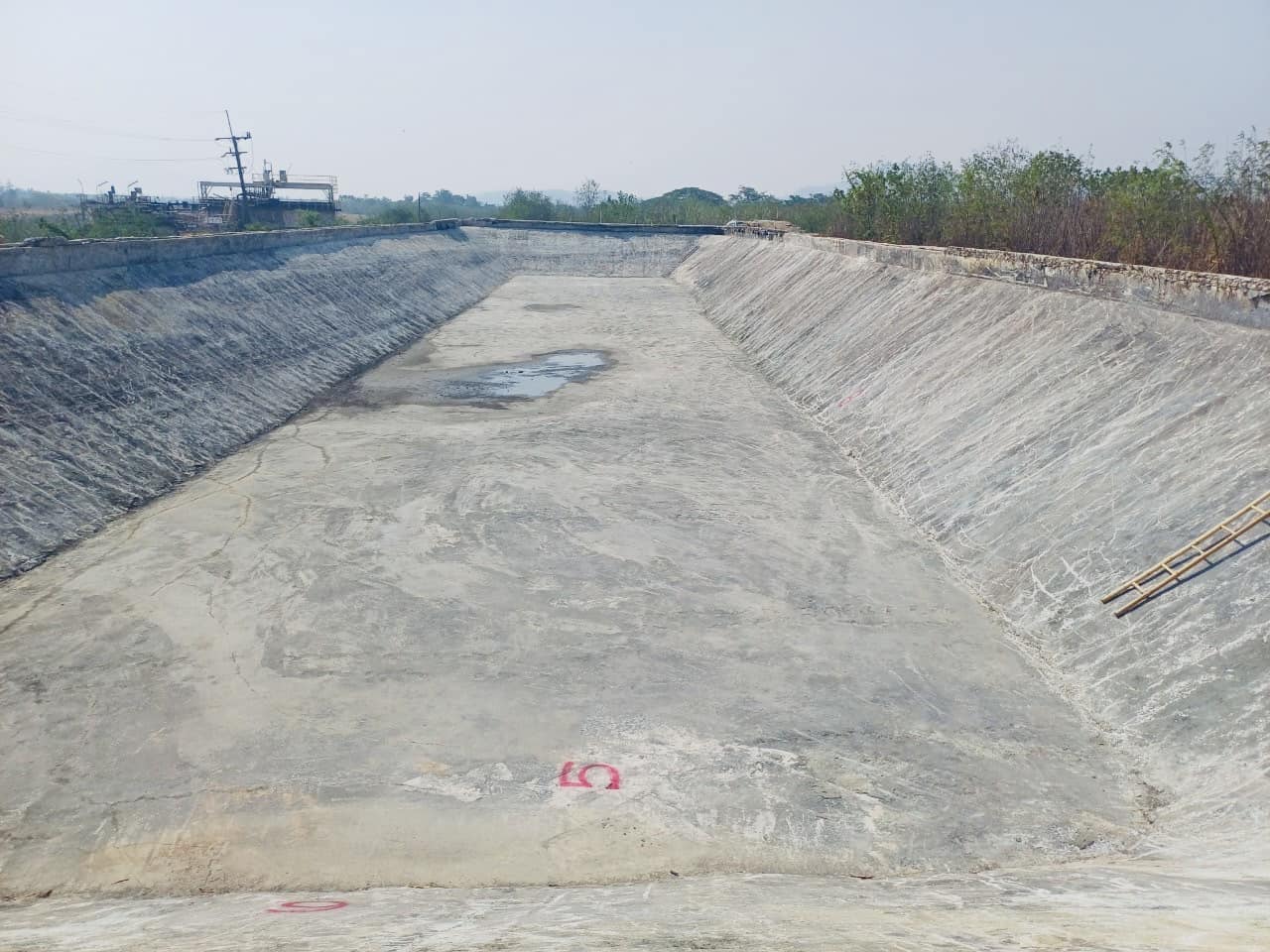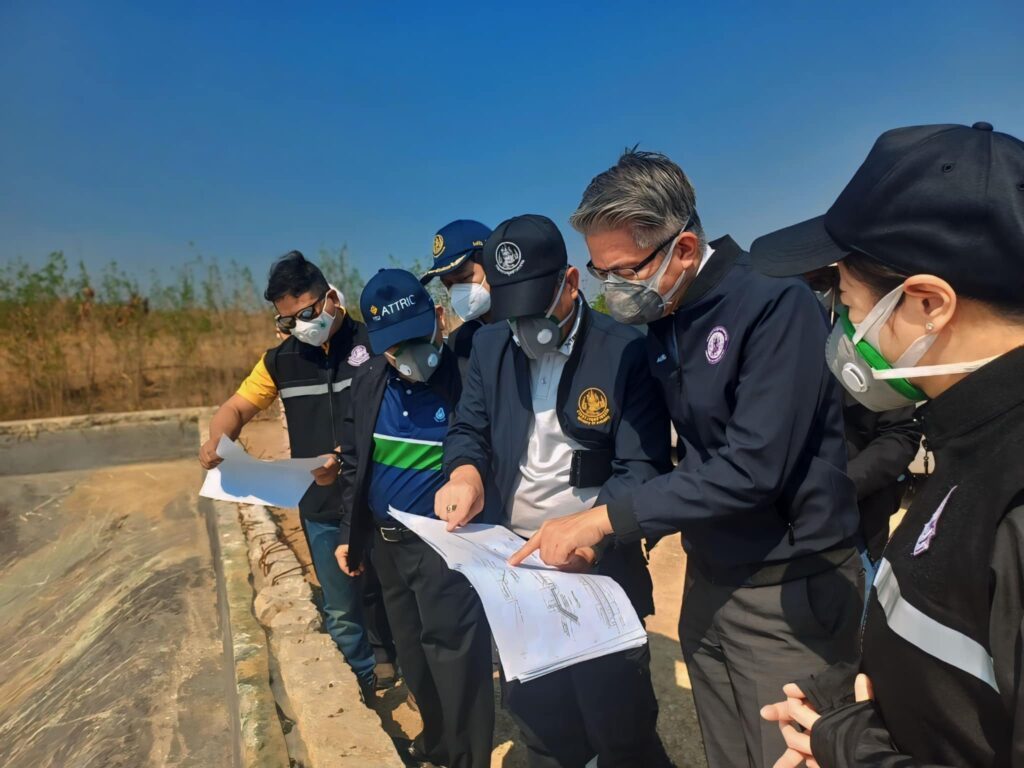No proof of legality is present to show that the waste generator of the cadmium waste discovered in various locations early this month could transfer the waste back to its original dump site and dump it as ever did, said pollution management experts
Sonthi Kotchawat, the country’s noted pollution management expert and a member with expertise of the Lower House’s Standing Committee on Industry has questioned an ongoing attempt to transfer the cadmium waste back to its original dump site in Tak province. 13,000 tonnes of the waste were found to have been removed from its secured landfills in Tak before being discovered in various warehouses and factories in Samut Sakhon, Chon Buri, and Bangkok, provoking public fears of chemical leakage and contamination as cadmium is hazardous.
The Industry Ministry has tried to resolve the issue by coming up with a plan to transfer the waste back to its original site and the company agreed to cooperate.
However, Mr. Sonthi, who has been examining the legality of the management of the waste, said the company was a zinc extractor, which had been operational before waste disposal or recycling plants were introduced following the ministry’s regulation years later. So, it was obliged to manage the waste, which was the zinc extraction by-product, under the mitigation measures placed as conditions attached to its periodical Environmental Impact Assessment reports.
According to its EIA reports, the company agreed to neutralise and bury the cadmium waste permanently in seven secured landfills in its area. This was found to be over 300,000 tonnes in total.
To dispose of the waste at its original site this time, the company must propose and re-submit measures as a new condition under its EIA and get permission first. Or it can apply for a 101 permit to operate as a waste disposal plant following the present ministerial regulation, but the process usually takes time as a plant owner needs to apply for an EIA before getting approval.
Mr. Sonthi said the company has not proposed the new measures under its EIA or applied for the permit, suggesting that the planned transfer of the waste has no legality to support.

Legality of cadmium waste removal
At the same time, Move Forward Party’s MPs who are also environmental experts have questioned the legality of the company’s removal of the waste out of its landfills in the first place, asking whether this has complied with the EIA requirements. During the press conference on Thursday, they demanded the Office of Natural Resources and Environmental Policy and Planning (Onep), which regulates EIA processes, to probe into the case while coming up with appropriate mitigation measures for it.
The MPs also questioned the permission granted for the transfer of the waste out of the landfills for disposal elsewhere, saying this is not made clear to the public. They demanded a thorough investigation be undertaken.
As revealed by concerned officials of the ministry, Bound and Beyond was found to be the one who asked for permission to transfer the waste out of its landfills to dispose of elsewhere despite the fact that its EIA said otherwise. The waste disposer as shown in some documents of the officials concerned is J and B Metal Co., Ltd., a factory in Samut Sakhon, which was the first location found storing the cadmium waste.
According to Tak Provincial Industrial Office, the waste was removed from the fifth landfill last year and the rest in the other six landfills would be removed by 2026 and transferred to J and B “for use”. J and B, as examined by Mr. Sonthi, was found to get a 106 permit just last year, which is usually granted to a recycling plant. However, to operate the plant legitimately and take in the waste for recycling, a plant owner must inform officials concerned to start the operation first, a condition which has been missed by J and B, according to Mr. Sonthi.
The Natural Resources and Environmental Crime Suppression Division (NED), which has been investigating criminality in the case, has found that J and B’s owner sold some cadmium waste to factories elsewhere, as being discovered and retrieved early this month, Isra News Agency reported. He claimed that his recycling equipment was not yet ready to recycle the waste, according to the NED. J and B therefore was deemed to have breached the contract signed with the waste generator, the NED concluded its initial investigation.
Bound and Beyond earlier conceded in its letters submitted to the SET that it is a trade counterpart of J and B in the contract. There is no proof of legality present either that it is allowed to remove the waste from its landfills for sale. The NED said it has not yet started investigating into the acts by Bound and Beyond as it has sent a letter to the Tak Provincial Industrial Office to examine any irregularities and file a complaint to it first, according to Isra’s report.
The Lawyers Council of Thailand, meanwhile, said it would set up a working group to work in this case to help those affected by the incident with legal procedures. Those possessing the waste as well as officials involved in this irregularity would be subject to lawsuits accordingly, according to the council.
The council is particularly concerned about the health of people living close to those factories from Tak to Bangkok. It has demanded blood and urine tests for them. The council stressed that the operation at the landfills must be investigated to see whether it had complied with the EIA in the first place. The council also agreed with the pollution management experts on the point that the waste generator cannot transfer the waste back to dispose of it again as it has no 101 permits. They have recommended that officials concerned dispose of the waste with authorised waste disposal or recycling plants.
“Do not forget to take legal action against the waste generator for removing the waste out of the landfills without permission and applying for a permission to transfer it to the waste disposer, which is not legitimate,” said Mr. Sonthi, who has been examining the case since the first days and updating the public about the progress of the case.
He also suggested the government widen the investigation into the trade of hazardous waste as in recent years there has been an increasing trend of illegal recycling plants operated by Chinese businessmen who may have been involved in a grey business. This follows the Chinese government’s policy to discourage recycling in the country and decline to take hazardous waste in for recycling in the country in 2018, resulting in an influx of recycling plants in countries in Southeast Asia, including Thailand, according to Mr. Sonthi.

The waste transfer plan
The Industry Ministry said otherwise, however. Industry Minister Pimphattra Wichaikul has confirmed this week that all the cadmium waste retrieved from various locations would be sent back to its original dump site.
The minister cited the assessment done by a newly appointed panel chaired by the ministry’s Permanent Secretary, Dr. Nattapol Rangsitpol, which recommended that the waste be transferred back and buried in the landfills, which can still be used with some improvements. They expected that the work could be completed within two months.
All the retrieved waste would be transferred and stored in the factory’s warehouse in Tak first, pending the improvement of the landfills, she said. The minister, however, has not mentioned the legality aspects involving the incident.
The ministry has also appointed a probe panel comprising various investigative agencies to help investigate the case. The scope of the panel’s investigation is not elaborated.
Also read: Environmental advocates call for disclosure of “missing” cadmium waste as it spills beyond the first location in Samut Sakhon province/ Finance Ministry found to be the third largest shareholder of “missing” cadmium waste trader
Indie • in-depth online news agency
to “bridge the gap” and “connect the dots” with critical and constructive minds on development and environmental policies in Thailand and the Mekong region; to deliver meaningful messages and create the big picture critical to public understanding and decision-making, thus truly being the public’s critical voice


